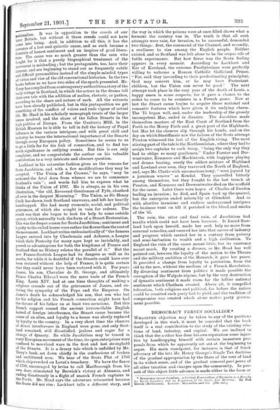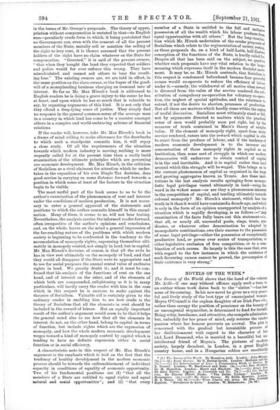DEMOCRACY VERSUS SOCIALISM.*
WHATEVER objection may be taken to any of the positions developed in this work, it must be conceded that the book itself is a real contribution to the study of the existing rela- tions of land, industry, and capital. We are inclined to think that the author has done his own reputation some injus- tice by handicapping himself with certain immature pro- posals from which he apparently set out at the beginning to argue. His main standpoint, for instance, is that of frank advocacy of the late Mr.. Henry George's Single Tax doctrine of the gradual appropriation by the State of the rent of land in its widest sense, and of the gradual removal par/ passu of all other taxation and charges upon the community. In pur- suit of this object little advance is made either in the form or • Democracy versus Socialism: a Critical Examination of Socialism as a Remedy Joe Social Injustice, and an Exposition of the Single Tax Doctrine. By Max Hirsch (Melbourne). Loudon Macniillau and Co. i-A0s. net. j
in the terms of Mr. George's proposals. The theory of appro. priation without compensation is restated in that—to English ears—peculiarly crude form in which, it being postulated that no Government can, even with the consent of all the present members of the State, morally sell or sanction the selling of the right to levy rent, it is thence assumed that the present holders of the right have no claim whatever on the State for compensation. " Granted," it is said of the present owners, " that when they bought the land they expected that soldiers and police would for ever enforce this wrong. They have miscalculated, and cannot ask others to bear the result- ing loss." The existing owners are, we are told in effect, in the same position as the slave-owner, or the buyer of the good- will of a moneylending business charging an immoral rate of interest. So far as Mr. Max Hirsch's book is addressed to English readers he is doing a grave injury to the cause be has at heart, and upon which he has so much that is valuable to say, by repeating arguments of this kind. It is not only that they offend a deep-lying sense of justice. They simply find no response in the general common-sense of the average man in a country in which land has come to be a counter amongst others in a complex and world-embracing scheme of financial relations.
If the reader will, however, take Mr. Max Hirsch's book in a frame of mind willing to make allowance for the drawbacks to which such a. standpoint commits him, it will repay a close study. Of all the requirements of the situation towards which modern industry is moving, nothing is more urgently called for at the present time than a really lucid examination of the ultimate principles which are governing our economic development. Mr. Max Hirsch, in the criticism of Socialism as a rival claimant for attention which he under- takes in the exposition of his own Single Tax doctrine, does good service in carrying us some distance forward towards a position in which some at least of the factors in the situation begin to be visible.
The most useful part of the book seems to us to be the author's examination of the phenomenon of rent and interest under the conditions of modern production, It is not neces- sary to enter a general approval of the statements and positions to which the author commits himself in this exami- nation. Many of them, it seems to us, will not bear testing. Nevertheless, the analysis carries the informed reader forward, often irrespective of the author's opinions and conclusions, and, on the whole, leaves on the mind a general impression of the far-reaching nature of the problems with which modern society is beginning to be confronted in the tendency to the accumulation of monopoly rights, expressing themselves ulti- mately in monopoly control, not simply in land, but in capital. Mr. Max Hirsch's doctrine, of course, is that all- the evils he has in view rest ultimately on the monopoly of land, and that they would all disappear if the State were to appropriate and to use for social purposes the annual rental value of exclusive rights in land. We greatly doubt it; and it must be con- fessed that his analysis of the functions of rent on the one hand, and of interest on the other, and of the elements of which both are compounded, enlightening as it is in many particulars, will hardly carry the reader with him in the case which in this respect he is anxious to make against the theories of Socialism. Valuable aid is certainly given to the ordinary seeder in enabling him to see how crude is the theory of Socialism that all the elements in rent should be included in the reward of labour. But an equally important result of the author's argument would seem to be that it helps the general mind also to see how that all the elements in interest do not, on the other hand, belong to capital in terms of function, but include rights which are the expression of monopoly, and how the whole modern economic development verges toward a kind of monopoly control by capital which is tending to have no definite expression either in social function or in social efficiency.
A characteristic note in this respect of Mr. Max Hirsch's argument is the emphasis which is laid on the fact that the tendency of healthy development in the modern economic process should be towards the enfranchisement of individual capacity in conditions of equality of economic opportunity. Two of his fundamental positions are (1) "that all the members of a State are entitled to equal rights and equal natural and Bagel opportunities"; and (2) " that every
member of a State is entitled to the full and euhuri possession of aU the wealth which his labour prodsim equal opportunities with all others." But the long ezamim tion which Mr. Hirsch undertakes of the cruder pro • oi Socialism which relate to the regimentation of society, • as these proposals do, on a kind of half-Latin, half- conception of the functions of the State, is hardly called for Despite all that has been said on the subject, we question. whether such proposals have any vital relation to the larger meaning which expresses itself in the modern Socialist more went. It may be, as Mr. Hirsch contends, that Socialism m this respect is condemned beforehand because four powerful causes would co-operate to reduce the efficiency of labour under it—namely, the withdrawal of all motive when reward is divorced from the value of the service rendered., the sub- stitution of compulsory co-operation for voluntary ce.oper.„ tion, the neglect of special aptitudes, and the reluctance to extend, if not the desire to shorten, processes of production But all these are matters which hardly come within the region of useful discussion. Socialism must ultimately stand or fall not by arguments directed to matters which the pramissi sense of men would probably soon put right, but by the measure of truth contained in Marx's theory of stirpins value. If the element of monopoly right, apart from social service rendered, enters into the reward which capital is able to exact from the produce of labour, and if the tendency of modern economic development is to the increase and concentration of those monopoly rights in capital as an institution, then some sort of struggle in which our modern democracies will endeavour to obtain control of capital is in the end inevitable. And it is capital rather than land around which this struggle will be waged. This brings us M the current pheriomenon of capital as organised in the huge and growing aggregates known as Trusts. Are these insti- tutions in the last analysis results springing from monopo- listic legal privileges vested ultimately in land—using the word in its widest sense—or are they a phenomenon inherent in the competition of capital, and tending ultimately towards colossal monopoly? Mr. Hirsch's statement, which has less truth in it than it would have contained a decade ago, and which is only in the form of an opinion unsupported by analysis of a situation which is rapidly developing, is as follows :—" Any examination of the facts fully bears out this statement—i.e., that all, or nearly all, successful pools, rings, trusts, syn• dicates, or whatever other denomination be adopted by
monopolistic combinations, owe their success to the possession of some legal privilege—either the possession of exceptionally productive land, or power over routes of transportation, or other legislative exclusion of free competition, or to a corn. bination of such causes. So largely is this the case that, even with regard to the few instances in which the existence of such favouring causes cannot be proved, the presumption of their existence is very strong."







































 Previous page
Previous page